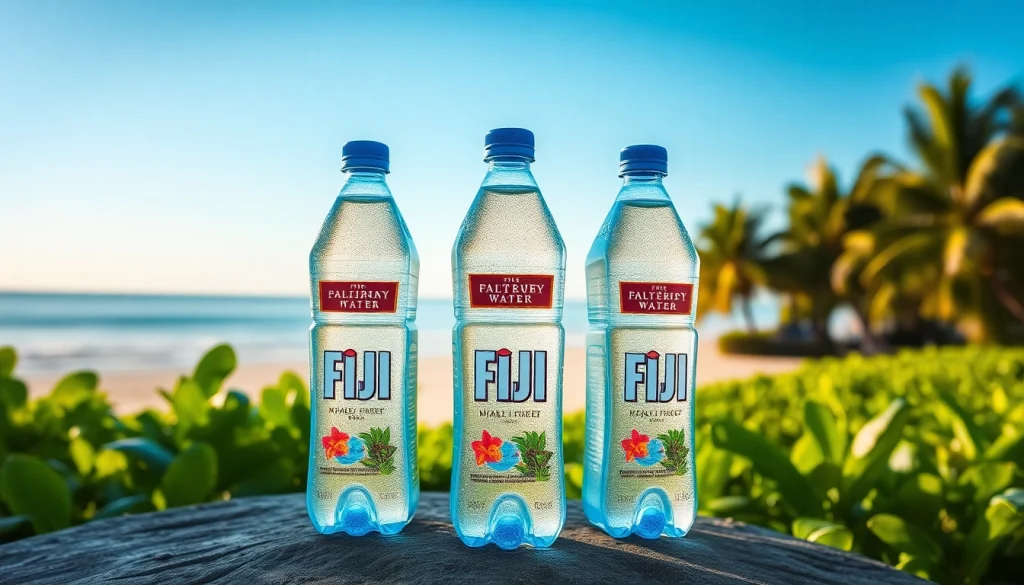
Understanding the FDA Recall of Fiji Water
On May 23, 2024, the U.S. Food and Drug Administration (FDA) announced a significant recall involving Fiji Natural Artesian Water. This recall impacted a staggering 78,533 cases, translating to approximately 1.9 million bottles sold primarily through Amazon. Such recalls raise serious concerns regarding food and beverage safety, and consumers are left to navigate the complexities that follow. To stay updated regarding fda recalls fiji water and related topics, it is essential to understand what triggered this recall and its implications.
What Triggered the Recall of Fiji Water?
The impetus behind the FDA’s decision was the detection of contaminants in the water. Following routine testing of various batches, it was determined that the Fiji water was tainted with elevated levels of manganese, alongside other bacterial agents. These findings prompted the FDA to categorize the recall as a Class III, indicating that the consumed product is not likely to cause adverse health effects but could potentially pose risks.
How Many Bottles Were Affected?
In total, 78,533 cases of Fiji Natural Artesian Water, which consists of around 1.9 million individual 500 mL bottles, were affected by this recall. The company’s proactive steps in addressing this issue illustrate the importance of transparency in the bottled water industry. Such large-scale recalls are rare but necessary when consumer health is at stake.
Details of the Contaminants Found
Manganese is a mineral that, in excess, can lead to various health problems, impacting neurological functions particularly in young children. The water also tested positive for certain bacteria, raising alarm among health authorities. Identifying the precise bacterial strains is crucial for understanding potential health risks and necessary consumer actions.
Health Concerns Related to Contaminated Fiji Water
Given the seriousness of the contaminants found, understanding the health implications is critical for consumers. The intersection of consumer safety and product integrity needs to be examined closely.
What is Manganese and Its Health Risks?
Manganese is a naturally occurring mineral found in soil, water, and various foods. While it is an essential nutrient required for several bodily functions, excess intake can lead to adverse health effects. Overexposure can lead to issues such as:
- Neurological disorders: Excessive manganese exposure has been linked to neurodegenerative disorders akin to Parkinson’s disease.
- Respiratory issues: Continued exposure can impact lung function, especially in industrial environments where manganese dust is prevalent.
- Developmental issues in children: Young children are particularly vulnerable as their neurological systems are still developing, making them susceptible to manganese toxicity.
Understanding Bacterial Contamination in Water
Bacteria in drinking water can come from various sources, including natural waterways, poorly maintained water systems, or contamination during bottling. Common bacterial contaminants include:
- Coliform bacteria: Presence suggests potential contamination from fecal matter, indicating the water may harbor harmful pathogens.
- Salmonella: Known for causing gastrointestinal illnesses.
- E. coli: Particularly dangerous due to its connection with severe foodborne illnesses.
In conclusion, bacterial contamination can pose significant health risks, including diarrhea, gastrointestinal distress, or more severe health complications, especially in individuals with compromised immune systems.
Guidelines from Health Authorities
The FDA and other health authorities provide critical guidelines to safeguard consumer health during recalls:
- Check recall announcements: Regularly monitor the FDA website or government health announcements for updates on recalled products.
- Avoid consumption: If you possess any affected products, do not consume them and prioritize safe disposal methods.
- Report issues: If adverse health effects are suspected, contact a healthcare professional and report the issue to the relevant authorities.
Consumer Responses and Precautions
In the aftermath of a recall, consumer awareness and proper response measures play crucial roles in ensuring public safety. Here are some suggested actions for consumers who may have purchased the recalled Fiji Water bottles.
What Should Consumers Do About the Recall?
The immediate step for consumers who identified they purchased Fiji Water within the recall period is to verify if their bottles are part of the affected batch. If confirmed, these steps should be taken:
- Stop consuming: Do not ingest any remaining water from the recalled bottles.
- Return or dispose: Return the bottles to the retailer for a refund or safe disposal methods.
How to Safely Dispose of Recalled Fiji Water Bottles
Proper disposal of contaminated products is crucial in preventing any accidental consumption. The following procedures are recommended:
- Seal the bottled water in a secure plastic bag to avoid any leaks.
- If possible, contact local disposal companies for instructions on proper hazardous waste management due to contamination.
Steps to Report Adverse Health Effects
If you believe you experienced adverse health effects from consuming contaminated Fiji Water, take the following actions:
- Document symptoms: Keep a detailed record of symptoms experienced, including duration and severity.
- Consult a healthcare provider: Seek medical attention and inform them about the recall.
- Report to the FDA: Use the FDA’s MedWatch reporting system to report any adverse effects.
Fiji Water’s Response to the Recall
In response to the recall, companies must take immediate action to reassure consumers, maintain brand integrity, and prevent future incidents. This involved Fiji Water adjusting its protocols, emphasizing quality control, and communicating openly with stakeholders.
Company Actions Following the FDA Announcement
Upon receiving the FDA’s report, Fiji Water initiated a voluntary recall and communicated effectively with consumers through various media, including press releases and social media updates. The company has also ramped up its internal quality checks to avoid similar occurrences in the future.
Assurances for Future Quality Control
Fiji Water has committed to more stringent quality control measures post-recall, which may include:
- Enhanced routine testing protocols.
- Increased transparency in reporting findings and corrective actions to the public.
- Collaboration with independent testing facilities to guarantee product safety continuously.
Impact on Fiji Water’s Brand Reputation
Brand reputation can take a significant hit following a recall. Consumers may question the safety of the brand in the future, which could lead to a decline in sales. Fiji Water’s proactive approach and communication strategy will play vital roles in re-establishing consumer trust.
Staying Informed About Water Safety and Recalls
The rapidly changing landscape of food safety underscores the importance of staying informed about potential recalls and safety alerts. Consumers should utilize various resources to remain updated.
Where to Find Updates on Water Recalls
Reliable sources for updates include:
- FDA website: Regular updates and announcements regarding food and beverage recalls.
- Your local health department: They may provide specific information for regional recalls.
- The manufacturer’s official site: Often provides timely communication regarding product safety issues.
Resources for Consumer Safety in Bottled Water
To ensure consumer safety, several organizations and initiatives focus on water quality:
- The U.S. Environmental Protection Agency (EPA): Provides guidelines and updates related to drinking water quality.
- The Bottled Water Association: Offers resources related to bottled water standards and safety practices.
Best Practices for Choosing Bottled Water Brands
As consumers navigate the myriad choices available in bottled water, these tips are essential for making informed decisions:
- Research brands: Investigate the company background, sourcing practices, and recall history.
- Check the labels: Look for certifications like NSF International, which indicate adherence to safety standards.
- Stay abreast of recalls: Regularly consult the FDA recalls website for the most current information.




